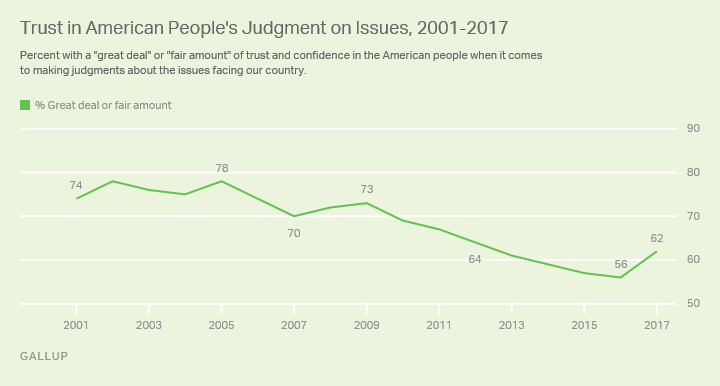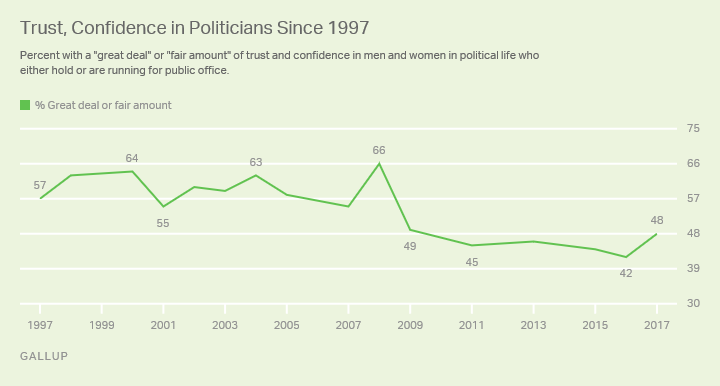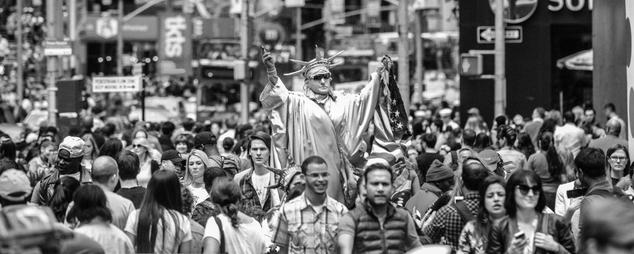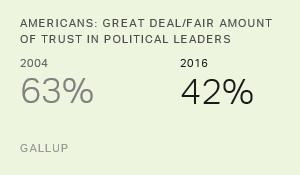Story Highlights
- 62% have a great deal/fair amount of trust in the American people
- This year's six-percentage-point increase follows seven years of record lows
- Trust in politicians also increased six points, from 42% to 48%
This story is part of a series focusing on Americans' confidence in various types of government and their views of the political parties and of the role and power of government. Follow the series on our Government topic page.
WASHINGTON, D.C. -- The public's trust in the American people's judgment on national issues rebounded somewhat this year after a seven-year slide. Sixty-two percent of U.S. adults now have a "great deal" (14%) or "fair amount" (48%) of confidence and trust in their fellow citizens, up from 56% last year.

Gallup's Sept. 6-10 survey asked U.S. adults how much trust and confidence they have "in the American people as a whole when it comes to making judgments under our democratic system about the issues facing our country." Prior to this year's turnaround, the percentage having a great deal or fair amount of trust had dropped a least one percentage point every year since 2009 -- reaching an all-time low of 56% in 2016.
The highest level of trust that Gallup has measured on this question came in the 1970s. Eighty-three percent had a great deal or fair amount of trust in 1974, and 86% had those levels of trust in 1976, the only two measures that decade. Since 2001, when Gallup began asking the question each September as part of its annual Governance poll, the percentage has never exceeded 78% -- reaching that level in 2002 and 2005.

Gallup Analytics
Subscribe to our online platform and access nearly a century of primary data.
Americans' Trust in Politicians Also Rising
Americans are less likely to express trust in the "men and women in political life in this country who either hold or are running for public office" than they are the American people, but this is also on the upswing. The 48% trusting these politicians today is up from a record low of 42% in 2016.
After varying between 55% and 64% for a decade, trust in those who seek or hold public office was at a near-record high of 66% during the 2008 presidential campaign between John McCain and Barack Obama, two of the most positively rated presidential candidates in recent memory. It then fell 17 points, to 49%, in Obama's first year in office and slid down another seven points by 2016.

Gallup measured trust and confidence in politicians three times in the 1970s and twice in the late 1990s, before asking it annually starting in 2000. The highest percentage expressing trust was 68% in April 1974, when Congress was about to open public hearings on whether to impeach President Richard Nixon. All 13 times the question was asked before 2009, at least 55% expressed trust in politicians, but the percentage has never reached 50% in the eight times the question has been asked since.
Older Americans More Likely to Trust Judgment of American People
More than two-thirds (69%) of adults aged 60 and older trust the judgment of the American people on national issues, compared with 64% of those aged 40 to 59, and 54% of those 18 to 39. Americans 60 and older have had more trust in the American public's judgment than those younger than 40 in every survey going back to 2001, though the gap has not always been as wide as it is today.
As might be expected, Republicans are now more likely to trust the American people in the wake of their political victories in 2016 than they were last year -- 67% now compared with 53% a year ago. Democrats are also more likely to express trust in the public, but the increase is less dramatic -- from 58% in 2016 to 64% now.
Though Republicans' trust in politicians (48%) is higher than a year ago (37%), Democrats are still more likely to show trust -- 59% now after a slight drop from 62% in 2016.
Bottom Line
One of the most basic arguments for having a democratic form of government is the belief that the general public will make sound judgments on major issues and that the political leaders they elect will do the same.
This past decade has seen a loss of trust in those beliefs as the nation dealt with serious economic blows, an increasingly partisan political landscape and government gridlock on most pressing issues.
From 2010 to 2016, trust in the major components of the U.S. government rose and fell with the shifting economic and political tides. Confidence in the nation's economy gained momentum in the most recent years amid signs of recovery. But in every one of those years, the percentage of Americans who say they trust their fellow Americans' judgment has eroded. By 2016, it had fallen to 56%, uncomfortably close to the point at which less than half of the public would have even a "fair amount" of trust and confidence in the American people to show good judgment on national issues.
The reversal of that seven-year decline is positive news at a time when the nation is wrestling with protests and political violence that raise new challenges for the nation's political system. In fact, the appearance that Americans are engaged in serious dialogue about these issues and events could be what has led people on both sides of the political aisle to feel more confident about the public's political discernment.
Survey Methods
Results for this Gallup poll are based on telephone interviews conducted Sept. 6-10, 2017, with a random sample of 1,022 adults, aged 18 and older, living in all 50 U.S. states and the District of Columbia. For results based on the total sample of national adults, the margin of sampling error is ±4 percentage points at the 95% confidence level. All reported margins of sampling error include computed design effects for weighting.
Each sample of national adults includes a minimum quota of 70% cellphone respondents and 30% landline respondents, with additional minimum quotas by time zone within region. Landline and cellular telephone numbers are selected using random-digit-dial methods.
View survey methodology, complete question responses and trends.
Learn more about how the Gallup Poll Social Series works.



